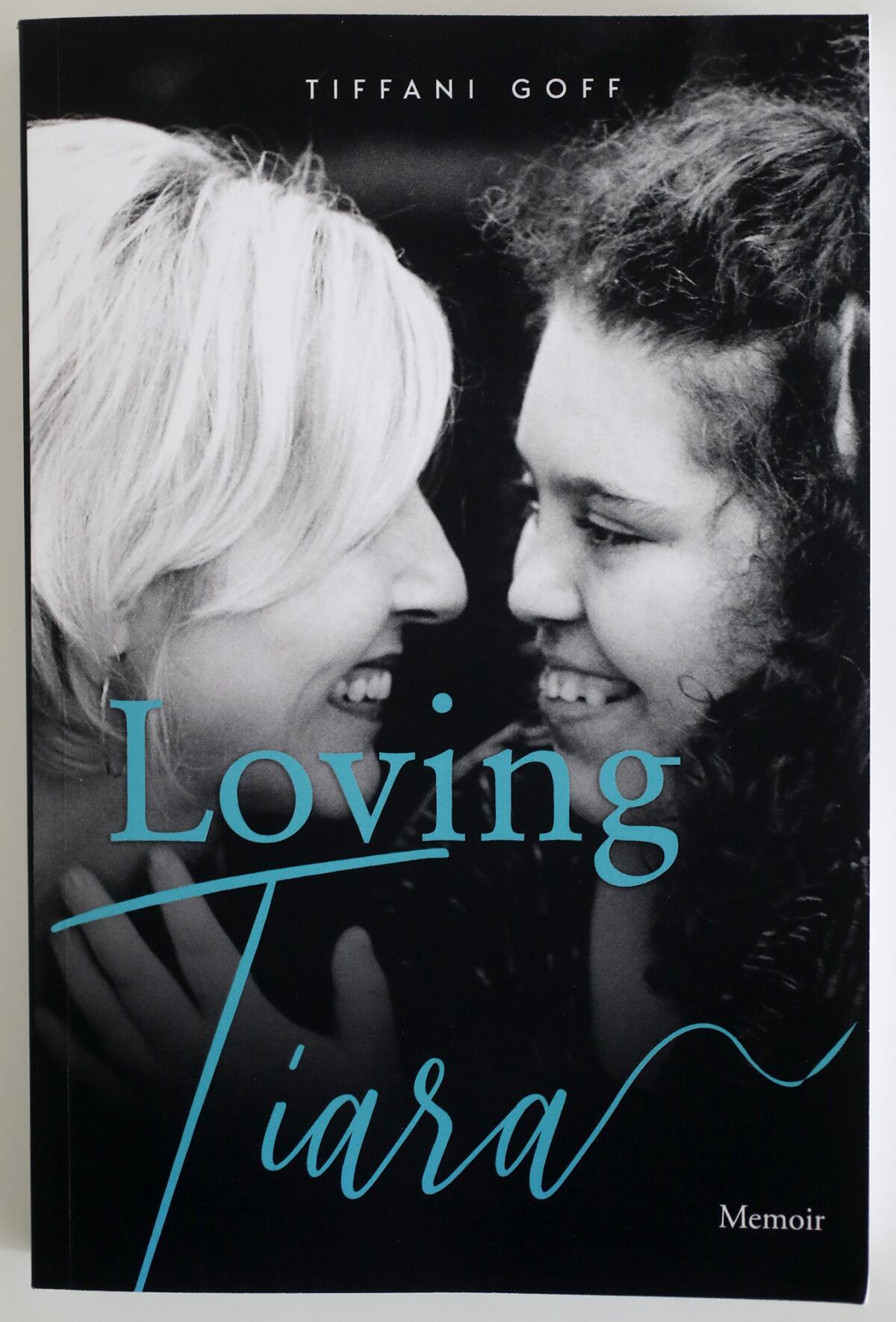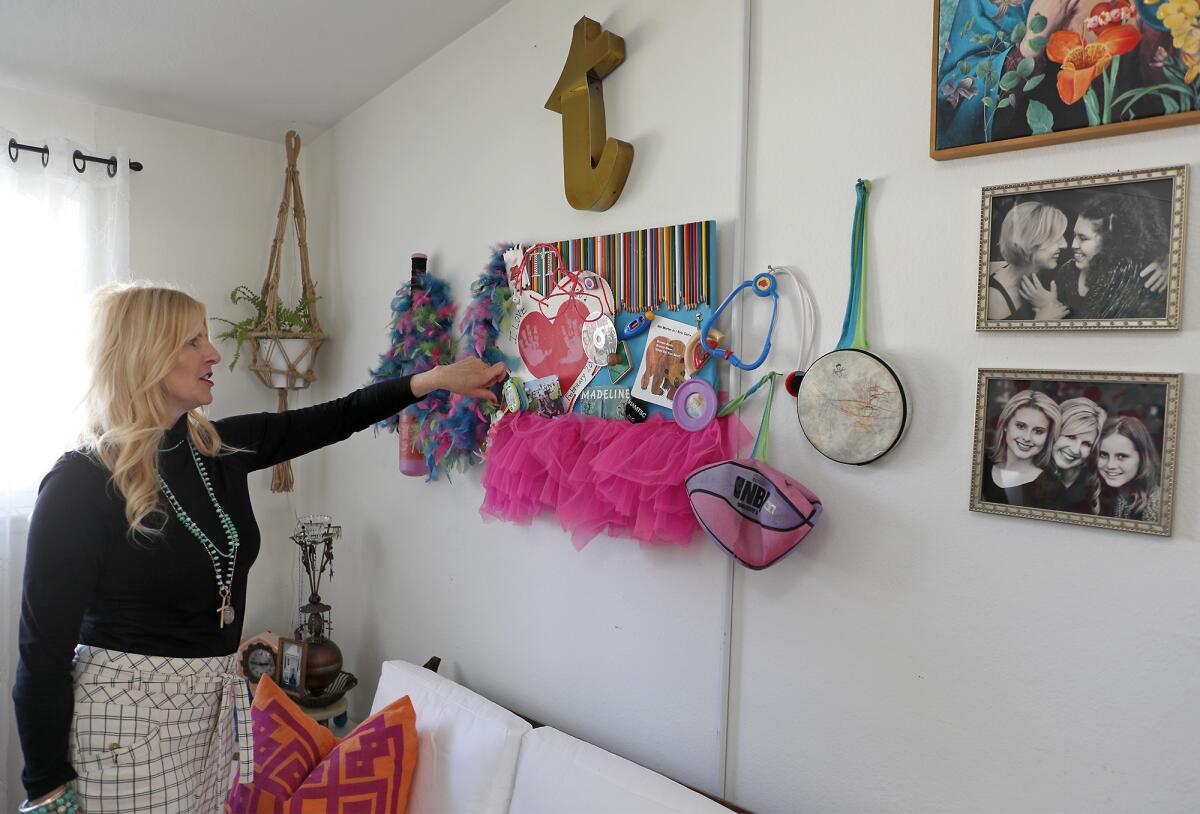A mother writes a memoir about 16 challenging, yet joyful, years of ‘Loving Tiara’

- Share via
Twenty years ago, the Daily Pilot ran a story for Mother’s Day about Costa Mesa resident Tiffani Goff and her then 18-month-old daughter, Tiara.
Even as a toddler, the characteristics that would define Tiara throughout her life were evident: her springy curls, wide hazel eyes and vivacious personality, which charmed everyone around her.
Yet the challenges Tiara faced — and that Tiffani faced in caring for her — were only beginning to become clear. Daily seizures impeded Tiara’s development, erasing basic abilities she had learned and limiting progress she tried to make.
Gone was her ability to clap her hands, and her walking and balance skills varied by the day. Both Tiffani and Tiara’s lives were consumed with doctor’s appointments, medical procedures and endless therapy sessions.
“For a couple months, I’ll forget she’s sick,” Tiffani told the reporter. “The next day, she’s back in the hospital.”
The article profiled Tiffani’s reality: caring for a child with an incurable genetic disorder, severe disabilities and a shortened lifespan.
It was a story with an ending yet to be seen — one that Tiffani hoped wouldn’t come too soon.
Tiffani’s days were punctuated by heartache and question marks. Would Tiara live past infancy? And if so, would she have a normal life? Or at least a happy one?
The answers lie in “Loving Tiara,” Tiffani’s memoir published in November 2019.
Inspired by her popular eponymous blog, in which she chronicled the joys and challenges of her family’s lives, “Loving Tiara” is as much a love letter to families raising children with disabilities as it is a tribute to a daughter gone too soon.

The memoir provides a portrait of parental love and endurance taken to its limits, as well as humorous vignettes of the Goffs’ daily struggle for normalcy.
They found it helpful to focus on what their daughter could do, instead of what she would never be capable of.
Tiara’s ability to learn and recover consistently surprised her family and physicians. Not only could she walk, but she sunk basketballs over and over through the hoop in her backyard — one of her favorite pastimes — and could speak in short sentences.
“And she brought so much joy,” Tiffani adds. “I don’t know if I did a good job of conveying that in the book, but she was funny. Like, so funny.”
With Tiara, there was always color, liveliness, and loudness. She knew every scene in her favorite movie, “Legally Blonde,” and enveloped her parents and sisters in bear hugs when they walked through the front door. She modeled clothes and jewelry, danced to music and enthusiastically celebrated at every party she was a part of.
A line from Tiara’s obituary captures her exuberant nature best: “In her presence no happy birthday song went unsung, no guitar un-played, no bowl of guacamole was safe and no heart untouched.”
The Goff family’s medical saga began when Tiara was diagnosed with tuberous sclerosis complex (TSC) at 8 months old. A rare genetic disorder affecting an estimated 50,000 people in the United States, TSC causes benign tumors to grow in vital organs, most commonly in the brain, heart, eyes, kidneys, skin and lungs.
There is no cure, though some people with TSC have symptoms so mild that the disorder goes undetected. This was not the case for Tiara, who had three different types of tumors in her brain alone and experienced multiple seizures a day when she was diagnosed at Children’s Hospital of Orange County.
A team of doctors gently relayed the grim prognosis to Tiffani and her husband, Louis Goff. Tiara’s tumors would likely result in severe developmental and intellectual delays, autism and intractable epilepsy — all of which Tiara eventually experienced.
It was not certain whether she would be able to walk and talk, or how long she would live.
The news was an emotional gut punch.
“I had to make a plan,” Tiffani writes in “Loving Tiara.” “How was I going to survive this new reality?”
A devout Catholic, she decided to make a promise to God: “Please, just keep her alive,” she prayed, “and I will do everything I can to care for her.”
It’s a promise she kept through the duration of Tiara’s 16 years.
Months before Tiara’s diagnosis, Tiffani had completed a law degree at Western State University in Fullerton. Now that her daughter was unwell, Tiffani put aside her legal aspirations in order to be a full-time caregiver for Tiara and stay-at-home parent to her other two daughters, Tabitha and Trinity.
Supervising Tiara and being her medical advocate proved to be 24/7 commitment.
Perhaps the best way to illustrate the demands of Tiara’s medical care is with numbers.
On a typical day, Tiara needed to take up to 25 pills of various medications morning and night. A minimum of two to three seizures struck at any time of day, and sometimes she experienced more than 10. She underwent two brain surgeries to remove tumors, endured dozens of hospitalizations — some lasting months — and between follow-up visits with doctors and occupational, physical, and behavioral therapy consultations, had too many appointments to count.
Out of necessity, Tiffani quickly became an expert on TSC and seizure medications. Many of the physicians had never seen or treated a case like Tiara’s, and at times Tiffani had to advise them on what to prescribe.
Tiffani’s existence was a constant balancing act. The day-to-day grind, as she discovered, could be more difficult than the impending loss of a child.
She wanted Tiara to have the best care possible but didn’t want to neglect her other children. There was no time left for herself.
“My life was doing stuff for my kids,” Tiffani said, “and trying to give the other girls a somewhat normal life. Because it wasn’t normal at all.”
Though the Goffs were grateful to have help from family members — both Tiffani and Louis’ parents live in Orange County — and sometimes hired trained aides to watch Tiara, they had little respite. Not many people could safely handle Tiara’s unique needs for more than a few hours at a time.
The situation was, in Tiffani’s words, “survival mode pretty much for 16 years.”
“Nobody had any idea what really went on in our world,” she said. “They’re just kind of shocked that that was our life.”
Another challenge was the silent scrutiny from strangers, who were often concerned by Tiara’s behavior or appearance. Due to brain damage from her constant seizures, Tiara had the mental capabilities of a 3- or 4-year-old child, and still acted like one: she needed diapers every day of her life, played in sandboxes, sang loudly, and sat on her mother’s lap, even when she reached her teenage years.
Her changing physique drew stares as well. At multiple times in her life, Tiara was either severely obese or dangerously emaciated. She gained a massive amount of weight for her 5’4” frame — topping over 300 pounds at her heaviest — as a side effect of one of her anti-seizure medications. Her weight dwindled to 80 pounds before and after brain surgery, and when a rare type of seizure caused daily vomiting.
When Tiara grew larger and stronger than her mother as a teenager, Tiffani’s fight to survive became literal. Tiara lashed out with increasing aggression and physically violent behavior — the worst side effect of her medication. Though she didn’t mean to hurt her mother, Tiara hit, bit, kicked, and in one terrifying instance tried to choke Tiffani while she drove in Friday afternoon traffic on the 405.
“I don’t really touch on it [in the book] as much because I didn’t want it to be too negative, but I feared she would kill me at the end,” Tiffani said. “And I was so afraid that she would hurt me or one of the girls, and then someone would take her away.”
Louis tried to intervene when he could, rushing home from his job as a luxury car salesman to help subdue Tiara. But he couldn’t always get home in time.
He shook his head, remembering. “It was just, I don’t know, scary as could be.”
It wasn’t that the Goffs hadn’t tried to get professional help for Tiara’s aggression. If anything, they’d exhausted their options. A behaviorist they worked with gave up after his methods failed to quell Tiara’s attacks. The Goffs reluctantly had Tiara admitted to a psychiatric ward at the recommendation of her doctors, but staff called the next day and asked for Tiffani to come back.
“That process isn’t made for a kid like her,” Tiffani said with a sigh. “It’s made for a kid who’s bipolar and needs some meds adjusted or whatever. It’s not for somebody [like Tiara] who is wearing a diaper and is on oxygen. And that’s the sad part, that people don’t realize: there is nowhere for these kids, these families.”
Tiffani started her blog when Tiara was 13, and it quickly gained traction online. Some of Tiffani’s posts had over 10,000 readers, and she and Tiara would get recognized as they walked around neighborhoods in Newport Beach and Costa Mesa.
When people read about the Goffs’ hardships, they wondered how they dealt with them. How did they cultivate hope and find happiness in the midst of perpetual uncertainty?
For Tiffani and Louis, the answer is to take life one second at a time.
“If you had told me that this was going to happen, [that] we were going to have a special needs daughter that’s this sick and has this many issues going on, I would have said, ‘There’s no way I could handle that,’” Louis said. “Sometimes you don’t feel like you’re going to. But there’s always that next second, that next minute, next hour, next day.”

Tiara suffered multiple cases of pneumonia throughout her life, the last of which proved too strong. She died on Jan. 15, 2015 at age 16 — years older and with a fuller life than many had predicted.
Her story has been an encouragement to thousands of readers, many of whom have children with disabilities. It was the blog’s fans that motivated Tiffani to write “Loving Tiara,” which she finished in honor of her 50th birthday and the fifth anniversary of Tiara’s death.
She still works on the blog and runs an interior decorating business that she started in the months after Tiara’s passing.
Tiffani hopes her daughter’s life will continue to have an impact through the memoir.
“People tell me every day [that] by telling the truth, it makes them feel better. And so I think that was part of Tiara’s thing. She wasn’t here very long, but she helped a lot of people. And I am continuing to do that for her.”
For more information about the memoir, go to tiffanigoff.com. Tiffani Goff hopes to have more book signings and events when COVID-19 restrictions end. May 15 is TSC Global Awareness Day
All the latest on Orange County from Orange County.
Get our free TimesOC newsletter.
You may occasionally receive promotional content from the Daily Pilot.






